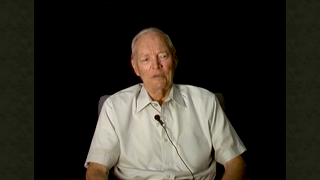6:06 | After the northern part of Okinawa was secured, the Marines of the 22nd Regiment moved south. Jack Houston was sent to be point man for the whole division and he was given two flares. Red if he found nothing, green if he found the enemy. Warily he moved out. Part 1 of 6. (This interview made possible with the support of JOHN & BARBARA MCCOY.)
Keywords : Jack Houston Okinawa Japanese mortar tomb cave point man flare spider hole machine gun rifle grenade

Jack Houston tried to enlist in the Navy after all his friends from school had left. His parents quashed that because he was only 16, but they promised to sign for him when he graduated high school. In December of 1943, he enlisted in the Marines and headed for Parris Island, where he shattered the M1 record on the rifle range. (This interview made possible with the support of JOHN & BARBARA MCCOY.)
The battle for Guadalcanal was long over when Jack Houston arrived. Even the mosquitoes had been defeated. After training in the jungle and in a mock village, he headed to Okinawa with the 22nd Marines. They were amazed at the lack of resistance when they landed and moved north. (This interview made possible with the support of JOHN & BARBARA MCCOY.)
The Marines were way ahead of schedule moving through the northern end of Okinawa. Jack Houston found out that the rear was more dangerous than the front when his buddy fled the aid station back at the beach. He watched two ragged Japanese planes tangle with a Hellcat and a Corsair. He cheered when one was shot down but there was some bad news with that. (This interview made possible with the support of JOHN & BARBARA MCCOY.)
The Marines moved out with tanks and infantry and got shot all to hell, so they advanced to the rear. The same thing happened the next day and Jack Houston barely made it back. That's when he saw the bullet holes in his sleeves. His rifle was broken so he had to improvise. Part 2 of 6. (This interview made possible with the support of JOHN & BARBARA MCCOY.)
Normally, there would have been two Marines to a foxhole, but the 22nd had lost so many that most men were alone. Jack Houston remembers getting no sleep that long, Okinawa night because of the falling parachute flare casings landing all around him. When he moved out the next day, a bullet cracked past his ear, which caused him to begin a bad habit. Part 3 of 6. (This interview made possible with the support of JOHN & BARBARA MCCOY.)
Jack Houston was part of an ad hoc group of Marines from several hard hit units on Okinawa. He was worried because a major was talking kind of funny. It sounded like he wanted them to move on a hill at night, which was not standard procedure in the Marines. Part 4 of 6. (This interview made possible with the support of JOHN & BARBARA MCCOY.)
Jack Houston had just helped his buddy dress a wound when he volunteered to return to the Okinawa hilltop where they were getting the enemy cleared out. When he got the jump on three of them, his muzzle flash gave him away and he had to leave in a hurry. He flung himself off the hill where he came face to face with a rifle. Part 5 of 6. (This interview made possible with the support of JOHN & BARBARA MCCOY.)
After three days of hellish fighting on Okinawa, Jack Houston heard someone yell that the 22nd Marines were relieved. He had just narrowly missed being killed by a mortar shell and, when he started back to the rear, everything seemed in slow motion. Part 6 of 6. (This interview made possible with the support of JOHN & BARBARA MCCOY.)
After the hard fought battle for Okinawa, Jack Houston's unit had some easy duty in China, transferring prisoners and guarding an airfield. He had a curious encounter with a Chinese officer who regaled him with Communist dogma. Then, interlopers from the Navy messed up his shopping in the local market. (This interview made possible with the support of JOHN & BARBARA MCCOY.)
Jack Houston was finally heading home from the Pacific. A Humphrey Bogart picture was playing on deck when a fire broke out and the confused crew reacted to the soundtrack. He wasn't yet done with danger, even on the train ride across the States. (This interview made possible with the support of JOHN & BARBARA MCCOY.)